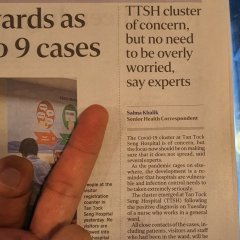Search the Community
Showing results for tags 'flu'.
-
Tot start a thread to alert this community whenever flu season is here. And name a couple sanitary and precautionary measures. Hopefully helps to contain the flu virus a bit. Flu virus usually gets into your body via eyes,nose thru inhalation and mouth. When flu alert is here, Sanitary measures : do not rub your eyes with dirty hands do not rub your nose with dirty hands do not rub your mouth with dirty hands wash your hands carefully before doing the above Precautionary measures : When in public places ,eg. trains,buses,busy malls,offices , wear a face mask wash your hands often,as your may unintentionally rub your eyes,nose,mouth when contacted flu,stay at home as and when possible, keep away from crowds to avoid spreading Above may not be exhaustive as i am not a trained doctor. Because of exposure to medical stuffs that i am aware of the above. Feel free to chip in if flawed. Yes the flu is here!
-
https://www.who.int/emergencies/disease-outbreak-news/item/2023-DON445 Situation at a glance On 23 February 2023, the Cambodia International Health Regulations (IHR) National Focal Point (NFP) reported one confirmed case of human infection with avian influenza A (H5N1) virus to WHO. A second case, a family contact of the first case, was reported on 24 February 2023. An outbreak investigation is ongoing including determining the exposure of these two reported cases to the virus. These are the first two cases of avian influenza A (H5N1) reported from Cambodia since 2014. In December 2003, Cambodia reported an outbreak of Highly Pathogenic Avian Influenza (HPAI) H5N1 for the first time affecting wild birds. Since then, and until 2014, human cases due to poultry-to-human transmission have been sporadically reported in Cambodia. H5N1 infection in humans can cause severe disease, has a high mortality rate, and is notifiable under IHR (2005). Description of the cases On 23 February 2023, the IHR NFP of Cambodia notified WHO of a confirmed case of human infection with avian influenza A (H5N1) virus. The case was an 11-year-old girl from Prey Veng province, in the south of Cambodia. On 16 February 2023, the case developed symptoms and received treatment at a local hospital. On 21 February 2023, the case was admitted to the National Pediatric Hospital with severe pneumonia. A sample was collected the same day through the severe acute respiratory infection (SARI) sentinel system and tested positive for avian influenza A (H5N1) virus by the reverse transcriptase-polymerase chain reaction (RT-PCR) at the National Institute of Public Health on the same day. The sample was also sent to Institute Pasteur Cambodia, the National Influenza Center, which confirmed the finding. The patient died on 22 February 2023. Cambodia shared the genetic sequence data of the virus from the index case through the publicly accessible database GISAID. Virus sequencing shows the H5N1 virus belongs to clade 2.3.2.1c, and similar to the 2.3.2.1c clade viruses circulating in poultry in southeast Asia since 2014. A total of twelve close contacts (eight asymptomatic close contacts and four symptomatic who met the suspected case definition) of the index case were identified and samples were collected and tested. Laboratory investigations confirmed the second case on 23 February 2023, the father of the index child. The father, who is asymptomatic, is in isolation at the referral hospital. The eleven other samples tested negative for A (H5N1) and SARS-CoV-2. As of 25 February 2023, a total of 58 cases of human infection with avian influenza A (H5N1) virus have been reported in Cambodia since 2003, including 38 deaths (CFR 66%); nine cases and seven deaths between 2003 to 2009 and 47 cases and 30 deaths between 2010 to 2014 were reported. Public health response A joint animal-human health investigation is underway in the province of the index case to identify the source and mode of transmission. Additionally, a high-level government response is underway to contain any further spread of the virus. WHO risk assessment These are the first human infections reported in Cambodia since 2014. Human infection can cause severe disease and has a high mortality rate. Almost all Influenza A (H5N1) infection cases in people have been associated with close contact with infected live or dead birds, or Influenza A (H5N1)-contaminated environments. Based on evidence so far, the virus does not infect humans easily and spreads from person-to-person appears to be unusual. An outbreak investigation is ongoing including identifying the source of exposure of the two reported cases to the virus. Since the virus continues to be detected in poultry populations, further human cases can be expected. Whenever avian influenza viruses are circulating in poultry, there is a risk for sporadic infection or small clusters of human cases due to exposure to infected poultry or contaminated environments. From 2003 to 25 February 2023, a total of 873 human cases of infection with influenza A (H5N1) and 458 deaths have been reported globally from 21 countries. Public health measures from both the human and animal health agencies have been implemented including monitoring of contacts of the laboratory-confirmed cases. While further characterization of the virus from these human cases is pending, available epidemiological and virological evidence suggest that current A(H5) viruses have not acquired the ability of sustained transmission among humans, thus the likelihood of sustained human-to-human spread is low. Based on available information so far, WHO assesses the risk to the general population posed by this virus to be low. The risk assessment will be reviewed as needed as further epidemiological or virological information becomes available. Vaccines against avian influenza A (H5N1) for human use have been developed for pandemic use but are not widely available. WHO, through its Global Influenza Surveillance and Response System (GISRS) monitors the evolution of the virus, conducts risk assessment, and recommends the development of additional new candidate vaccine viruses for pandemic preparedness purposes. Close analysis of the epidemiological situation, further characterization of the most recent viruses (human and poultry) and serological investigations are critical to assess associated risk and to adjust risk management measures promptly. WHO advice Given reports of sporadic influenza A (H5N1) cases in humans, the widespread circulation in birds and the constantly evolving nature of influenza viruses, WHO continues to stress the importance of global surveillance to detect and monitor virological, epidemiological, and clinical changes associated with emerging or circulating influenza viruses that may affect human (or animal) health and timely virus sharing for risk assessment. When avian influenza viruses are circulating in an area, people involved in high-risk tasks such as sampling sick birds, culling, and disposing of infected birds, eggs, litter and cleaning of contaminated premises should be provided with and trained in the proper use of appropriate personal protective equipment. All persons involved in these tasks should be registered and monitored closely by local health authorities for seven days following the last day of contact with infected poultry or their environments. In the case of a confirmed or suspected human infection caused by a novel influenza virus with pandemic potential, including a variant virus, a thorough epidemiologic investigation (even while awaiting the confirmatory laboratory results) of history of exposure to animals, of travel, and contact tracing should be conducted. The epidemiological investigation should include early identification of unusual respiratory events that could signal person-to-person transmission of the novel virus and clinical samples collected from the time and place that the case occurred should be tested and sent to a WHO Collaboration Centre for further characterization. Currently, there is no vaccine widely available to protect against avian influenza in humans. WHO recommends that all people involved in work with poultry or birds should have a seasonal influenza vaccination to reduce the potential risk of reassortment. Travelers to countries with known outbreaks of animal influenza should avoid farms, contact with animals in live animal markets, entering areas where animals may be slaughtered, or contact with any surfaces that appear to be contaminated with animal faeces. General precautions include regular hand washing and good food safety and food hygiene practices. Should infected individuals from affected areas travel internationally, their infection may be detected in another country during travel or after arrival. If this were to occur, further community-level spread is considered unlikely as on the basis of available information, this virus has not acquired the ability to transmit easily among humans. WHO advises against the application of any travel or trade restrictions based on the current information available on this event. WHO does not advise special traveler screening at points of entry or restrictions with regard to the current situation of influenza viruses at the human-animal interface. All human infections caused by a novel influenza subtype are notifiable under the International Health Regulations (IHR) and State Parties to the IHR (2005) are required to immediately notify WHO of any laboratory-confirmed case of a recent human infection caused by an influenza A virus with the potential to cause a pandemic. Evidence of illness is not required for this report.
- 32 replies
-
- 2
-

-
- h5n1
- avian influenza a
-
(and 7 more)
Tagged with:
-
here we go again
-
Five South Koreans die after getting flu shots, sparking vaccine fears Read more at https://www.todayonline.com/world/five-south-koreans-die-after-getting-flu-shots-sparking-vaccine-fears SEOUL — Five people have died after getting flu shots in South Korea in the past week, authorities said, raising concerns over the vaccine's safety just as the seasonal inoculation programme is expanded to head off potential Covid-19 complications. Authorities said there was no reason to believe the deaths were linked to the vaccine but an investigation, including post mortems, was underway. "It makes it hard for us to put out a categorical statement," South Korean Vice Health Minister Kim Gang-lip told a briefing on Wednesday (Oct 21) about the deaths, which include a 17-year-old boy and a man in his 70s. Coming just weeks after the rollout of the national vaccine programme was suspended over safety worries, the deaths have dominated headlines in South Korea. Officials last month announced plans to procure 20 per cent more flu vaccines for the winter than the previous year to inoculate 30 million people in a bid to prevent the health system being overloaded by patients with flu and Covid-19 exposure. However, the start of a free jab programme for around 19 million eligible people was suspended for three weeks after it was discovered that some five million doses, which need to be refrigerated, had been exposed to room temperature while being transported to a medical facility. Boosting public trust in vaccines has become a major global challenge this year, as some countries rush to approve experimental Covid-19 vaccines before full safety and efficacy studies have been completed. South Korea's flu vaccines are supplied by different drugmakers, including LG Chem Ltd and Boryung Biopharma, a unit of Boryung Pharm. A Boryung official said the company was aware of the reported deaths, but had no immediate comment. LG Chem said the company would follow government advice. A 17-year-old boy who died on Friday was the first death noted by officials to follow receipt of the vaccine. The boy died two days after receiving the flu shot in Incheon, near the capital Seoul. A man in his 70s, who had Parkinson's disease and arrhythmia, was the most recent case. He died in Daegu on Wednesday, a day after receiving the flu vaccine. Daegu officials said the man had received vaccines since 2015 with no prior adverse reactions. Officials said 8.3 million people have been inoculated with the free flu vaccine since it resumed on Oct 13, with around 350 cases of adverse reactions reported. The highest number of deaths linked to the seasonal flu vaccination was six in 2005, according to Yonhap news agency. Even before the coronavirus pandemic, trust in vaccines was a growing challenge for public health bodies. The World Health Organization named vaccine hesitancy as one of the top 10 global health threats for last year. In South Korea, a poll earlier this month found that 62 per cent of 2,548 respondents in Gyeonggi province, near Seoul, would not get vaccinated against Covid-19, even if a vaccine is approved, until all safety questions are fully answered. REUTERS
-
http://www.bbc.com/news/health-38988982 If you're having aches and pains, it might even be due to a deficiency in Vitamin D. Many of us who works in office, from early morning till late night, don't get enough sunshine. You might be Vit D deficient without knowing it.
-
I am having a slight fever, my body is telling me that i m gonna catch a flu soon.. Went to ZTP, i asked them what's good for fever/flu. They recommended me Antelope tea.. $5 for one bottle.. Because its $5, i end up walk away with Lou Han Guo + Barley Drink, total $2.4.. =p I just wonder is that Antelope tea is so powerful? $5.. Expensive for a bottle of drink...
- 27 replies
-
- antelope tea
- health
- (and 4 more)



.png)



